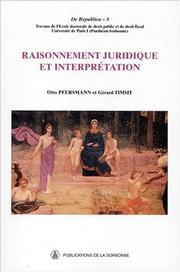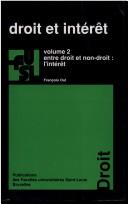| Listing 1 - 10 of 15 | << page >> |
Sort by
|
Book

ISBN: 2735122794 2735120430 2735117588 Year: 2017 Publisher: Paris : Éditions de la Maison des sciences de l’homme,
Abstract | Keywords | Export | Availability | Bookmark
 Loading...
Loading...Choose an application
- Reference Manager
- EndNote
- RefWorks (Direct export to RefWorks)
Le défi consiste à appréhender un mécanisme emblématique de la constitutionnalisation de ces pays. C'est-à-dire la conciliation entre la légitimité démocratique et la nécessité de la « puissance de l'État », élément historiquement ancré dans la région des Amériques. À travers leurs recherches, les auteurs entendent cerner ce qui fait la spécificité de cette dynamique afin de comprendre le passage de constitutions républicaines à des constitutions démocratiques contemporaines.
Philosophy --- Constitution --- démocratie --- philosophie du droit
Periodical
ISSN: 14679337 09521917 Year: 1988 Publisher: [Oxford] : Blackwell Publishers Ltd.
Abstract | Keywords | Export | Availability | Bookmark
 Loading...
Loading...Choose an application
- Reference Manager
- EndNote
- RefWorks (Direct export to RefWorks)
Law --- Jurisprudence --- Philosophy --- Jurisprudence. --- Law (Philosophical concept) --- Rechtstheorie. --- Rechtsfilosofie. --- Rechtsphilosophie --- Philosophie --- Rechtswissenschaft --- Rechtslehre --- Philosophy. --- Droit --- Philosophie du droit. --- Règle de droit. --- Filosofia del dret. --- Jurisprudència --- Rechtsphilosophie.


ISSN: 16230450 ISBN: 2859444033 9791035107789 9782859444037 Year: 2021 Volume: 3 Publisher: Paris : Éditions de la Sorbonne,
Abstract | Keywords | Export | Availability | Bookmark
 Loading...
Loading...Choose an application
- Reference Manager
- EndNote
- RefWorks (Direct export to RefWorks)
La juridicisation croissante de notre vie publique et le fonctionnement de l’État de droit ont rendu nécessaire de reposer la question des modes de raisonnement fondant désormais les décisions judiciaires, de plus en plus importantes, de plus en plus nombreuses, qui régissent notre activité quotidienne. L’enjeu n’en est pas négligeable. Au-delà d’une vision « technologique » du droit – le droit, une technique, un outil... –, c’est aussi, et de manière peut-être plus inquiétante, une vision plus politique qui en est souvent suggérée : la mort annoncée du droit comme technique autonome, capable de résister au politique – simple habillage, habile camouflage, d’une décision dont la motivation ne serait jamais – ne pourrait jamais être – mise en échec, orientée, ou commandée par les contraintes du droit. Entre positivisme et réalisme, l’oscillation risque d’être catastrophique. Entre ces deux abîmes, cet ouvrage tente d’ouvrir les voies d’une réflexion rigoureuse et scientifique sur les moyens intellectuels les plus nécessaires à l’affirmation – et à l’affermissement – de l’État de droit.
Law --- Methodology --- Philosophy --- Interpretation and construction --- 340.1 --- Rechtstelsels: soorten en vormen --- 340.1 Rechtstelsels: soorten en vormen --- Law - Methodology - Congresses --- Law - Philosophy - Congresses --- Law - Interpretation and construction - Congresses --- droit --- État --- décision judiciaire --- Interpretation du droit --- Philosophie du droit --- Théorie generale du droit
Periodical
ISSN: 00658995 20496494 Publisher: England : Oxford University Press, H. Milford.,
Abstract | Keywords | Export | Availability | Bookmark
 Loading...
Loading...Choose an application
- Reference Manager
- EndNote
- RefWorks (Direct export to RefWorks)
The American Journal of Jurisprudence is an international journal publishing critical discussions of the moral foundations of law and legal systems, exploring current and historical issues in ethics, philosophy of law or jurisprudence, and legal (including constitutional) theory.
Legal theory and methods. Philosophy of law --- Law --- Natural law --- Droit --- Droit naturel --- Philosophy --- Periodicals --- Philosophie --- Périodiques --- Law (Philosophical concept) --- Natural law. --- Rechtstheorie. --- Rechtsfilosofie. --- Common law. --- Natuurrecht. --- Droit naturel. --- Philosophie du droit. --- 241 <05> --- Moraaltheologie. Theologische ethiek--Tijdschriften --- Constitution and Judicial System --- General and Others --- Périodiques --- EJDROIT EPUB-ALPHA-A EPUB-PER-FT OXFUNIPRE-E --- Law of nature --- Natural rights --- Nature, Law of --- Rights, Natural --- Periodicals. --- Law of nature (Law) --- Nature, Law of (Law) --- Philosophy. --- Jurisprudence --- Advice and Rights.
Book
ISBN: 3319754971 3319754955 9783319754956 Year: 2018 Publisher: New York: Springer,
Abstract | Keywords | Export | Availability | Bookmark
 Loading...
Loading...Choose an application
- Reference Manager
- EndNote
- RefWorks (Direct export to RefWorks)
This book examines how the nation – and its (fundamental) law – are ‘sensed’ by way of various aesthetic forms from the age of revolution up until our age of contested democratic legitimacy. Contemporary democratic legitimacy is tied, among other things, to consent, to representation, to the identity of ruler and ruled, and, of course, to legality and the legal forms through which democracy is structured. This book expands the ways in which we can understand and appreciate democratic legitimacy. If (democratic) communities are “imagined” this book suggests that their “rightfulness” must be “sensed” – analogously to the need for justice not only to be done, but to be seen to be done. This book brings together legal, historical and philosophical perspectives on the representation and iconography of the nation in the European, North American and Australian contexts from contributors in law, political science, history, art history and philosophy
Law. --- Justice. --- Arts. --- Political science. --- Law --- Fundamentals of Law. --- Philosophy of Law. --- Philosophy. --- Acts, Legislative --- Enactments, Legislative --- Laws (Statutes) --- Legislative acts --- Legislative enactments --- Jurisprudence --- Legislation --- Administration --- Civil government --- Commonwealth, The --- Government --- Political theory --- Political thought --- Politics --- Science, Political --- Social sciences --- State, The --- Arts, Fine --- Arts, Occidental --- Arts, Western --- Fine arts --- Humanities --- Injustice --- Conduct of life --- Common good --- Fairness --- Philosophy of law. --- Law—Philosophy. --- Arts, Primitive --- Philosophie du droit --- Art
Book

ISBN: 9062009824 9789062009824 Year: 1996 Publisher: Brugge: Die keure,
Abstract | Keywords | Export | Availability | Bookmark
 Loading...
Loading...Choose an application
- Reference Manager
- EndNote
- RefWorks (Direct export to RefWorks)
eigendom & zekerheidsfunctie van het eigendomsrecht bij leasing soorten leasing roerend onroerend eigendomsrecht als zekerheid & eigendomsrecht van vennoot in een vennootschap met rechtspersoonlijkheid & fiduciaire eigendom tot zekerheid fiduciaire & rechtsmisbruik inzake eigendom & eigendom en intellectuele rechten & b.w.art.1743 huur verkoop vaste datum & rechtspositie van de appartementseigenaar volgens de w.30.06.94 & eigendom en overheid in het licht van Ger.w.art.1412bis uitvoeringsimmuniteit & bouwen op andermands grond recht van natrekking vergoedingsregeling
Burgerlijk recht --- Colloques --- Colloquia --- Droit civil --- leasing --- eigendomsrecht --- Law of real property --- opstal --- Property --- Propriété --- 347.23 <493> --- -Property --- Possession (Law) --- Things (Law) --- Wealth --- Eigendomsrecht--België --- 347.23 <493> Eigendomsrecht--België --- -Eigendomsrecht--België --- Propriété --- Law and legislation --- Congresses --- Congrès --- Economics --- Belgium --- Zakenrecht --- België --- Eigendomsrecht--België --- E-books --- Congresses. --- Primitive property --- Property - Belgium --- DROIT CIVIL BELGE --- LEASING --- DROIT DES SOCIETES --- PROPRIETE INTELLECTUELLE --- BAIL --- DROIT MEDICAL --- DROITS FONDAMENTAUX --- PHILOSOPHIE DU DROIT --- DROIT DES BIENS --- PROPRIETE --- LIMITATION --- INTERET PRIVE --- ABUS DE DROIT --- DROIT DES ASSOCIES --- DATE CERTAINE --- COPROPRIETE --- COPROPRIETE PAR APPARTEMENTS --- ACCES AU DOSSIER MEDICAL --- DROIT ECONOMIQUE --- ETHIQUE MEDICALE
Book
ISSN: 18607306 ISBN: 9783161518263 3161518268 3161566564 9783161566561 Year: 2012 Volume: 62 Publisher: Tübingen: Mohr,
Abstract | Keywords | Export | Availability | Bookmark
 Loading...
Loading...Choose an application
- Reference Manager
- EndNote
- RefWorks (Direct export to RefWorks)
Intellectual property law has been harmonized by EU law to a considerable extent. At the same time intellectual property rights have converged. The academic discussion has not kept pace with this development. European intellectual property law is often seen through the spectacles of national law; pan-European discussions about issues of Community law seem to be the exception rather than the rule. The contributors to this volume investigate if and to what extent European rules and principles applicable to all intellectual property rights already exist or whether they can be found on the basis of the acquis communautaire and comparative law. In particular, they discuss the merits and the methodology of common principles before turning to several areas of substantive intellectual property law such as grounds of protection, secondary liability and exceptions, to enforcement and finally to the relationship between intellectual property and neighbouring areas of EU law.
Intellectual property --- Propriété intellectuelle --- Propriété intellectuelle (droit européen) --- -Antitrust law --- -346.048 --- Uh7 --- Lb1 --- Anti-trust law --- Competition --- Competition law --- Trusts, Industrial --- Commercial law --- Trade regulation --- IP (Intellectual property) --- Proprietary rights --- Rights, Proprietary --- Intangible property --- Law and legislation --- Law --- UE/CE Droit. --- Propriété intellectuelle. --- Rapprochement des législations. --- Principes du droit. --- Droit de la concurrence. --- Philosophie du droit. --- Intellectual property. --- Europe. --- Europe --- Propriété intellectuelle --- Geistiges Eigentum --- Rechtsvergleich --- EU-Recht --- Harmonisierung des Privat- bzw. W --- Handels- und Gesellschaftsrecht, Wirtschaftsrecht, Steuerrecht --- Internationales Privatrecht, Ausländisches Recht, Rechtsvergleichung --- Pologne --- Lituanie
Book

ISBN: 2847882081 2847886257 9782847882087 Year: 2010 Publisher: Lyon: École normale supérieure,
Abstract | Keywords | Export | Availability | Bookmark
 Loading...
Loading...Choose an application
- Reference Manager
- EndNote
- RefWorks (Direct export to RefWorks)
Comment et pourquoi la philosophie juridique et politique contemporaine est-elle revenue à Kant ? Il faut, pour le comprendre, s'intéresser d'abord à l'ancrage de la pensée du droit dans la théorie kantienne de la raison pratique et aux problèmes que pose le statut kantien d'une raison normative oeuvrant dans les deux champs coordonnés de l'éthique et du droit. L'articulation entre droit privé et droit public, entre droit et politique dans la Métaphysique des moeurs doit être considérée en relation avec l'exigence d'une fondation unitaire du système des normes pratiques. La philosophie politique de Kant peut dès lors être envisagée dans le prolongement que lui offre sa théorie du droit international, avec l'ouverture d'une perspective cosmopolitique qu'il importe de définir avec précision. Cet ouvrage, qui réunit des auteurs comptant parmi les spécialistes de Kant les plus reconnus, propose une enquête systématique sur la philosophie kantienne du droit. À l'aide d'analyses très précises des écrits kantiens, les différentes contributions offrent une vue d'ensemble des directions actuelles de la recherche. Elles montrent leur pertinence philosophique dans un contexte profondément différent de celui dans lequel Kant a élaboré cette philosophie, celui de la Révolution française, mais qui la rend d'une certaine façon plus actuelle qu'en son temps.
Law --- Philosophy --- Kant, Immanuel, --- Kant, Immanuel --- Kant, I. --- Kānt, ʻAmmānūʼīl, --- Kant, Immanouel, --- Kant, Immanuil, --- Kʻantʻŭ, --- Kant, --- Kant, Emmanuel, --- Ḳanṭ, ʻImanuʼel, --- Kant, E., --- Kant, Emanuel, --- Cantơ, I., --- Kant, Emanuele, --- Kant, Im. --- קאנט --- קאנט, א. --- קאנט, עמנואל --- קאנט, עמנואל, --- קאנט, ע. --- קנט --- קנט, עמנואל --- קנט, עמנואל, --- كانت ، ايمانوئل --- كنت، إمانويل، --- カントイマニユエル, --- Kangde, --- 康德, --- Kanṭ, Īmānwīl, --- كانط، إيمانويل --- Kant, Manuel, --- philosophie --- politique --- droit --- Kant (Emmanuel) --- Kant, Emmanuel, 1724-1804 --- Kant, Immanuel, - 1724-1804 --- Kant, Immanuel (1724-1804) --- Contribution à la philosophie du droit

ISBN: 280280071X 2802800728 2802800736 280280426X 2802803182 2802804081 9782802800712 9782802800729 9782802800736 Year: 1990 Volume: 49 Publisher: Bruxelles: FUSL,
Abstract | Keywords | Export | Availability | Bookmark
 Loading...
Loading...Choose an application
- Reference Manager
- EndNote
- RefWorks (Direct export to RefWorks)
Le Séminaire interdisciplinaire d'études juridiques des Facultés universitaires Saint-Louis a suscité la collaboration de juristes et de spécialistes en sciences humaines afin d'éclaircir les rapports multiples entre les notions de droit et d'intérêt. Ce thème s'est révélé si fécond qu'il est apparu nécessaire de publier les résultats de ces travaux dans trois volumes distincts. Le présent volume a pour titre: Entre droit et non-droit l'intérêt. Il part de l'idée que I'intérêt a toujours été, dans la pensée juridique traditionnelle, ou disqualifié (ramené au fait, rejeté dans le non-droit), ou surqualifié (assimilé au droit subjectif et ainsi «normalisé»). Comme s’il était impossible de reconnaître des effets juridiques spécifiques à l'intérêt entre droit et non-droit. Comme s'il fallait nécessairement raisonner dans les termes d'une logique binaire. À l'encontre de celle-ci, l'auteur plaide pour la prise en compte d'une « échelle des intérêts » qui, des intérêts illicites aux intérêts consacrés sous forme de droits subjectifs, ménage la diversité de leurs formes et la variété de leurs fonctions dans l'ordre juridique. Fonction créatrice qui consiste à transformer certaines prétentions en droits subjectifs et certaines personnes ou certains groupes en acteurs juridiques. Fonction limitative qui, à l'inverse, conduit à contrôler l'exercice des droits subjectifs et la toute-puissance des volontés individuelles. Fonction de régulation globale enfin, qui contribue à la mise en place d'un nouveau mode de production du droit qui fonctionne à I'intérêt et à la norme et se superpose au module classique fonctionnant au droit subjectif et à la loi. Cette analyse de droit positif conduit à poser des questions de théorie générale du droit (droit dont les frontières sont relativisées et les sources diversifiées), de philosophie politique (sur les tensions internes au libéralisme) et d'éthique (sur les apories d'une légitimité purement solipsiste).
Legal theory and methods. Philosophy of law --- Interest (Ownership rights) --- Intérêt (Droit) --- Law --- Philosophy. --- Philosophy --- 340.11 --- 340.1 --- AA / International- internationaal --- 340.12 --- 340.0 --- Séminaire interdisciplinaire d'études juridiques tenu en 1987. --- N16 - Théorie du droit - Rechtstheorie --- Interest (Law) --- Property --- Rechtstheorie. Rechtsvinding--(algemeen) --- Natuurrecht. --- Recht: algemene werken en handboeken. --- -Philosophy --- 340.13 --- 347 <493> --- 347.01 --- Burgerlijk recht. Privaatrecht--?.01 --- Hulpwetenschappen --- rechtswetenschappen en criminologie --- Interest (Ownership rights). --- rechtswetenschappen en criminologie. --- 340.11 Rechtstheorie. Rechtsvinding--(algemeen) --- 347.01 Burgerlijk recht. Privaatrecht--?.01 --- Droit privé --- Privaatrecht --- Comparative law --- Droit --- Droit comparé --- Recht --- Rechtsvergelijking --- Vergelijkend recht --- Intérêt (Droit) --- Rechtswetenschappen en criminologie. --- Belgium --- Civil law --- Interdisciplinary approach in law --- Séminaire interdisciplinaire d'études juridiques tenu en 1987 --- Natuurrecht --- Recht: algemene werken en handboeken --- Law - Philosophy --- intérêt --- légitimité --- loi --- norme --- privé --- notion de droit --- droit comparé --- droit des personnes --- droit des mineurs --- droit pénal --- droit constitutionnel --- droit de l'environnement --- droit du travail --- droit d'auteur --- droit international --- Interet --- Norme juridique --- Philosophie du droit

ISBN: 271161266X 9782711612666 Year: 1996 Publisher: Paris: Vrin,
Abstract | Keywords | Export | Availability | Bookmark
 Loading...
Loading...Choose an application
- Reference Manager
- EndNote
- RefWorks (Direct export to RefWorks)
Philosophy, German --- Law --- Civil law --- Public law --- Philosophie allemande --- Droit --- Droit civil --- Droit public --- Philosophy --- History --- Philosophie --- Histoire --- Kant, Immanuel, --- Contributions in law --- Criticism and interpretation --- Et le droit --- Critique et interprétation --- Kant, Emmanuel, --- Philosophie du droit --- --Law --- 1 KANT, IMMANUEL --- Filosofie. Psychologie--KANT, IMMANUEL --- Kant, Immanuel --- -Law --- -Contributions in law --- 1 KANT, IMMANUEL Filosofie. Psychologie--KANT, IMMANUEL --- Jurisprudence --- Kant, Emmanuel --- Kant, Emanuel --- Kant, Emanuele --- Kant, I. --- Kānt, ʻAmmānūʼīl, --- Kant, Immanouel, --- Kant, Immanuil, --- Kʻantʻŭ, --- Kant, --- Ḳanṭ, ʻImanuʼel, --- Kant, E., --- Kant, Emanuel, --- Cantơ, I., --- Kant, Emanuele, --- Kant, Im. --- קאנט --- קאנט, א. --- קאנט, עמנואל --- קאנט, עמנואל, --- קאנט, ע. --- קנט --- קנט, עמנואל --- קנט, עמנואל, --- كانت ، ايمانوئل --- كنت، إمانويل، --- カントイマニユエル, --- Kangde, --- 康德, --- Kanṭ, Īmānwīl, --- كانط، إيمانويل --- Kant, Manuel, --- Law - Philosophy --- Kant, Immanuel, - 1724-1804 --- Kant, Emmanuel, 1724-1804
| Listing 1 - 10 of 15 | << page >> |
Sort by
|

 Search
Search Feedback
Feedback About UniCat
About UniCat  Help
Help News
News